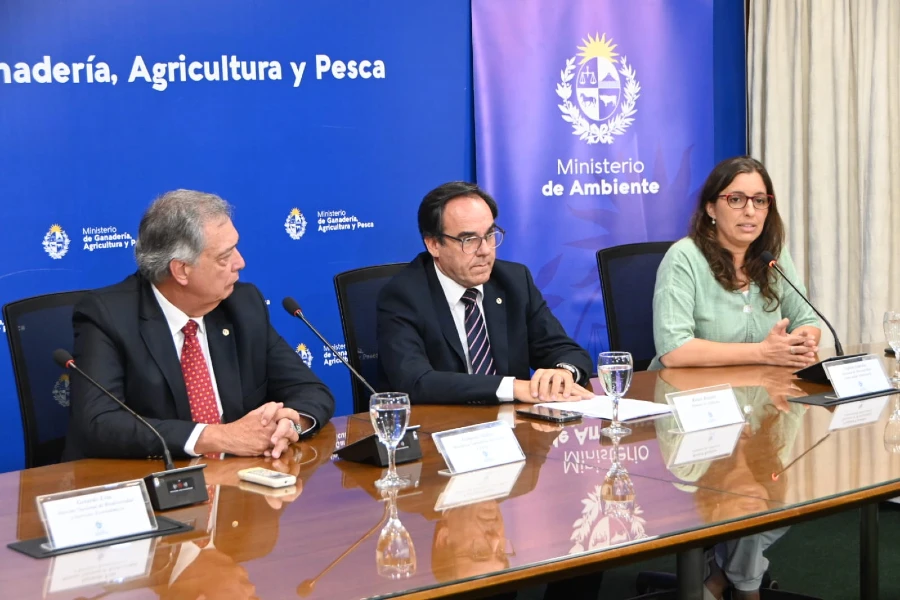Uruguay Adopts New Regulations for Gene-Edited Crop Approval Process

In a collaborative effort aimed at enhancing agricultural, aquacultural, and forestry production, the Ministries of Environment and Livestock, Agriculture, and Fisheries in Uruguay have embarked on a joint venture to analyze New Genetic Improvement Techniques applicable to various products and organisms within these sectors and their derivatives.
The unveiling of a new decree outlining the procedural framework for this collaborative effort, including the establishment of a Technical Working Group (TWG), was announced on Monday, March 18th, during a press conference led by Ministers Robert Bouvier of the Ministry of Environment and Fernando Mattos of the Ministry of Livestock, Agriculture, and Fisheries.
This regulatory framework signifies the culmination of concerted efforts between the two ministries. Central to its provisions is the formation of a Technical Working Group tasked with scientifically and objectively determining whether products or organisms obtained through these techniques should fall under regulations applicable to Genetically Modified Organisms (GMOs).
Don’t miss out! Subscribe to our newsletter for the latest content straight to your inbox, or register for FREE to gain full access.
Each authorization related to the use of these novel techniques will undergo a comprehensive analysis process, with equal participation from both ministries in decision-making.
Speaking at the announcement held at the Ministry of Livestock, Agriculture, and Fisheries, Minister of Environment Robert Bouvier emphasized the government’s shared commitment to promoting innovation and sustainable development, coupled with a steadfast responsibility towards the protection and conservation of biodiversity.
The Ministry of Environment (MA) will approach the subject with a focus on the product rather than the process. Minister Bouvier stated, “Our approach is geared towards preventing potential adverse effects, with a particular emphasis on biodiversity protection.” He added, “We will meticulously evaluate the characteristics of each new product derived from New Genetic Improvement Techniques, taking necessary measures to avoid any repercussions they may generate.”
Furthermore, technical capabilities and cooperation with scientific institutions such as the National Institute of Agricultural Research (INIA), National Seed Institute (INASE), University of the Republic (UdelaR), Pasteur Institute Montevideo, Technological Laboratory of Uruguay (LATU), and the Clemente Estable Biological Research Institute (IIBCE) have been bolstered.
The Technical Working Group (TWG) will comprise experts in molecular characterization drawn from both the Ministry of Livestock, Agriculture, and Fisheries and the Ministry of Environment, as well as other relevant bodies, including INIA, INASE, UdelaR, Pasteur Institute Montevideo (IP-Montevideo), LATU, and IIBCE.
Minister of Livestock, Agriculture, and Fisheries, Fernando Mattos, hailed the new regulation as “a milestone for this administration concerning genetic improvement in agricultural production.” He added, “This step opens up a vast array of possibilities for the country. We face the challenge of maintaining food security (…). Meeting the demand for high-quality, nutritious food within current production parameters is exceedingly difficult. We must ensure food quality and quantity aligned with environmental care and sustainability.”
Gerardo Evia, Director of the National Biodiversity and Ecosystem Services Directorate (Dinabise) at the Ministry of Environment, and Virginia Guardia, Director of the General Directorate of Biosafety and Food Safety (Digebia) at the Ministry of Livestock, Agriculture, and Fisheries, participated in the conference, underscoring their pivotal roles as leading implementing units of the Technical Working Group and outlining the administrative and technical procedures involved in the analysis.


Responses